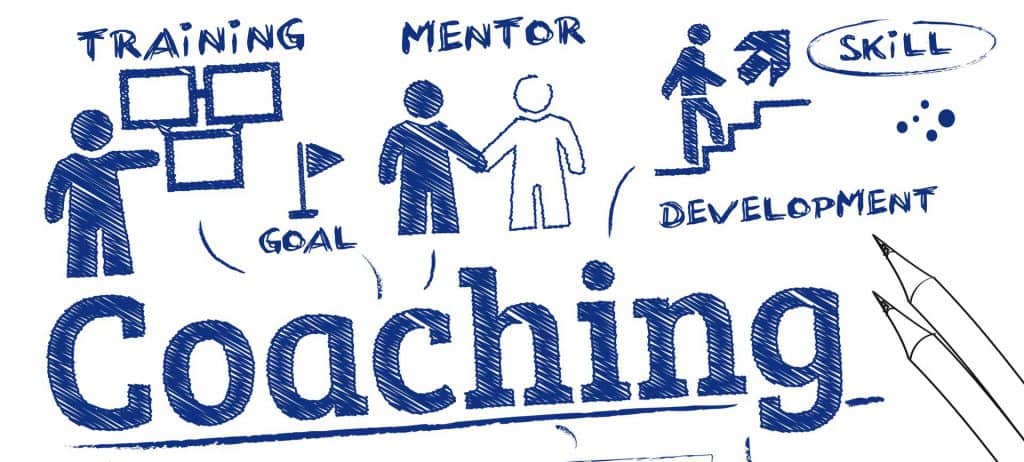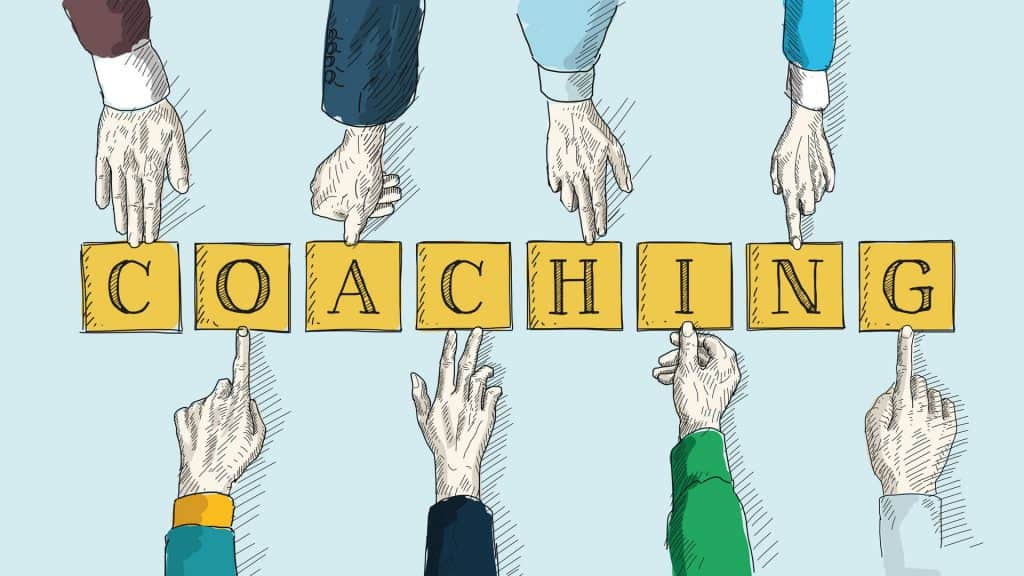Adviser, mentor, confidant. Since the dawn of time, ambitious people have relied on aides to help them see the right path. In the 1980s, they’ve been replaced with life coaches – those with enough wisdom and experience to guide us towards happiness and success.
Today, there’s a life coach for nearly everything, from nutrition and wellness to business and leadership. For every quandary, hardship, and struggle, there’s a person that knows the way through.
Whether you need someone to help you overcome your obstacles or a person to show you the best way to the top, finding a good life coach is a challenge of its own.
This article is the complete guide on how to find the right coach for your personal needs. You’ll learn about life coaching and its many advantages.
But first, let’s talk about the basics.
Table of Contents
What is a Life Coach?

Life coaching is often compared to counseling, therapy, mentoring, and consulting. These practices are similar in that all of them strive to help you achieve your goals. But the difference between them is that each of them strives to help you in its own way, using its own methods.
So what is a life coach, exactly?
In one word, a life coach is a strategist.
Unlike a therapist, who is first and foremost a healer, a life coach doesn’t dwell into your past and dig deeper into your subconsciousness. A life coach is interested in three simple things – the place you’re currently at, the place you want to be at, and the best way for you to get there.
Let’ say you’ve been heartbroken. In this scenario, a therapist’s mission would be to take you down the memory lane and have you count your heartbreaks in order to discover what makes you exposed to this particular kind of emotional distress and why. This is a long way around.
A life coach, on the other hand, would simply mend you.
This is the person that will get you from point A to point B.
But this doesn’t mean that life coaching takes shortcuts. Eventually, it achieves the same thing as therapy does, but in a different way. To put it simply, life coaching is an action-oriented approach to overcoming a specific challenge or a set of obstacles on your way to fulfillment.
Most importantly, life coaching trusts you to do the right thing.
Life coaching recognizes that you are the only person in your life who knows who you really are, what you want to be, and how you need to get there. The answers are deep within you, hidden and concealed. Through guidance, a life coach can help you unveil and clarify them.
Life Coach vs Therapy
How do you choose what’s better for you? Try answering this question: do you need a healer or a strategist?
This is where you need to stop, take a deep breath, and think about the road that is in front of you. You are the only one who knows what you need. Which means you are the only one who can answer this question. It may help you to imagine the task at hand as a journey or a quest.
During this quest, who do you see helping you arrive at the journey’s end?
If you are feeling too tired, wounded, or broken to even imagine moving forward, then you need a healer. This is your impaired psyche weighing you down and keeping you paralyzed. Don’t be afraid, you’ll get better. You just need a good doctor to take a look and prescribe therapy.
But if you’re ready to take a charge and pursuit your goals, but are a bit overwhelmed, afraid, and confused about your course of action, then you need a strategist. A life coach will give you a push. Or more precisely, a life coach will guide you into becoming your own support system.
Whatever you choose, don’t make a hasty decision.
In case you’re struggling with a deeply rooted issue such as depression, a life coach would be able to fix you only to a certain extent.
Using a suitable method of psychotherapy, a therapist would help you eliminate the root problem, while a life coach would only make you more functional.
10 Signs You Really Need a Life Coach

Most of us need a life coach because we need someone to help us during our big transition in our lives. For many of my clients, life coaching is an effective way to deal with relationship issues and professional challenges.
In the majority of cases, however, life coaching boils down to navigating self-doubt, fear of failure, and low self-esteem.
Here are 10 telltale signs that you need a life coach:
1. Self-Doubt Has Been Holding You Back
Doubt is the opposite of belief. When you’re questioning who you are and what you do, you’re losing trust in yourself and what you’re capable of. Not only is it hard for you to make a decision and stick to it, but you’re also constantly overthinking, apologizing, quitting, and stepping back.
Always second-guessing yourself is exhausting.
It’s also what prevents you from living the life you want.
Or achieving anything at all, for that matter.
Your thoughts shape who you are. If you spent years thinking that you’re bad at your job and incapable of doing anything right, you’ll start living a self-fulfilling prophecy. You’ll become the person you’re embarrassed by, too humiliated and weak to get up and start proving yourself wrong.
2. Your Inability to Define a Clear Vision
Have you ever achieved an important goal only to sink into a confusing, crippling depression the day after? This is known as the Olympic syndrome, as it is common among professional athletes. It’s also a recurring problem for people who live from one milestone to another without a vision.
A life’s vision is a sum of all your personal goals.
Without a clear vision, you’re facing two scenarios. You’ll either spend your life moving through motions without ever achieving anything, or you’ll spend yourself on meaningless projects that don’t really reflect who you are or bring you any satisfaction. In both cases, you’ll feel lost.
3. You’re Afraid of Failures
Fear drives so many of your worst instincts.
Self-doubt is a fear of failure. Not having a life’s vision, again, fear of failure. The most immobilizing and dangerous of all human conditions, fear would rather see you do nothing at all than do anything wrong. And, spoiler alert, that’s awfully irrational. Or in other words, unfounded.
If you’re procrastinating more often than you should, then you’ve been infected with fear too. That’s also why you’re feeling so anxious all the time and in all aspects of your life. But guess what, the fear you’re suffering from can make you or break you as a person. The choice is yours.
Overcoming fear will make you unstoppable. Succumbing to it can only make you want to stop before you go.
4. You Don’t Have a Strong Support System
Sometimes, people bail when times get tough. Sometimes, people are dismissive. Friends can leave you hanging when you need them the most. Boyfriends don’t always offer encouragement. There are moments when your family simply doesn’t follow up. Colleagues, they just don’t care.
It hurts, but it’s how things sometimes are. And that’s okay.
Having a support system is important because failures do happen. You don’t have to be a broken person to be your worst enemy – being human is quite enough. But you don’t have to count on other people to pick you up either. You don’t have to quit you when everyone else does.
5. You Have a Poor Quality of Life
Perhaps you’ve got yourself covered emotionally. Maybe you’re already a fearless goal-getter that others look up to for support. There are other things that may stand in your way to the top, things that have nothing to do with self-doubt.
Maybe you’re just messy and disorganized. Creative people often are.
Of course, you wouldn’t be reading this if you were feeling like a success on every front. Learning to add structure to your creative chaos is not at all easy, but it is necessary. Without any structure, your quality of life inevitably suffers.
That’s why you’re here reading this in the first place – you’re feeling out of sync with your full potential.
6. You Don’t Know How to Deal with Rejections
Rejection “communicates the sense to somebody that they’re not loved or not wanted, or not in some way valued”, explains Geraldine Downey, Ph.D., a professor of psychology at Columbia University. Anyone who was ever rejected will agree.
Being rejected is never easy. It openly tells you that you’re not worthy enough.
Rejection actually stimulates the brain in a way similar to physical pain. That’s how much it hurts.
But consider this – J. K. Rowling’s original Harry Potter pitch was famously rejected by 12 publishers. Did that stop her from becoming one of the world’s most loved and successful ladies? No. Rejections only made her more stubborn.
7. You Have Abandonment Issues
Are abandonment issues wreaking havoc in your relationships?
Here’s how you can tell:
Gentle souls that suffer from this frustrating problem tend not to think things through. They attach too quickly and move on just as fast (if they don’t settle for an unhealthy relationship, that is). They are either partner pleasers or obsessed with finding deal-breaking flaws.
Whatever the case, abandonment issues are much more serious than your typical case of separation blues. If you don’t uproot them in time, they’ll make you sabotage every relationship in your life. And yes, being alone is perfectly fine, but only if that’s your conscious choice.
With abandonment issues, you’re not in control.
8. You’re Continuously Sabotaging Yourself
Seriously, why do you keep doing that to yourself?
Well, there are two different types of self-saboteurs – those that are afraid of failure and those that are afraid of success. When you’ve crippled your potential with self-doubt, the least you can do is stay in control over your failures by avoiding opportunities at any cost, right?
You’re thinking – what you don’t know about yourself cannot hurt you.
Perhaps trying harder will make it obvious that you’re simply not good enough. It’s safer not to study for an exam than to study and fail nevertheless. News flash: everyone’s afraid of their limits and nobody’s born limitless. But your unpushed limits will eventually crush you.
9. You Want to Develop Self-Acceptance
If so, good for you!
Self-acceptance improves emotional well-being, studies say, and it’s only natural that it does. Vice versa, low self-acceptance can scar you for life. Pushing your boundaries against all odds is one way to achieve greatness, but learning to embrace your limits first is much healthier.
That way, you’ll actually be able able to get up if you fall. In all honesty, you’ll be able to proudly say that you’ve given your best shot. You’ll be able to perceive mistakes as a learning curve. More than any other school of thought, self-acceptance is a precursor to healthy growth.
You are who you are. Your failures don’t define you.
10. You’re Ready to Change
What are some other signs that you desperately need to change the way you approach life? People who seek life coaching often feel restless and tense as well. And the way things are in the world, it’s really no wonder that we are all depressed, unmotivated, stressed, and scared.
If you’re unhappy at least once a day every day if there’s no stimulation in your life, if you’re anxious about tomorrow, and if you can’t conquer your fears no matter how hard you try, the best you can do is join the club. These are uncertain times we live in. Make you your own constant.
You should learn to rely on yourself.
And sometimes, asking for help is the most meaningful example of self-reliance.
So, are you ready to change?
Different Types of Life Coaches

With life coaching being a self-improvement technique that can address and solve specific problems as effectively as general ones, the opportunity arises for you to pick a professional that specializes in helping people to overcome the type of challenge that’s been holding you back too.
These are the 10 most popular types of life coaches you can choose from.
1. Confidence Coach
Every single issue we’ve discussed, except for maybe a lack of support system and poor quality of life, are nothing but low self-esteem in disguise. Of course, confidence is half the battle. Whatever your life’s vision may be, it will be twice as hard for you to achieve it without confidence.
A confidence coach will help you address these issues, regardless of how they manifest themselves. Whether you’re shy professionally, emotionally, or say, sexually, a confidence coach can teach you how to challenge your doubts, overcome your fears, and maximize your self-esteem.
The first lesson – getting out of your comfort zone.
2. Relationship Coach
A relationship is a broad concept, as there are so many people you can form healthy or dysfunctional relationships with. There are therefore just as many relationship coaching specialties: from different types of couples coaching to family, singles and love coaching.
As an individual, you can decide to work on your relationship issues alone or together with the other person. Make that a group of people, in the case of family or business relationship coaching. The end goal, as it were, is to facilitate one’s way through a relationship or a lack thereof.
In all of its variants, relationship coaching addresses the social aspect of life.
But in order to do that, it must also help you build a healthy relationship with yourself first.
3. Leadership Coach
Leadership coaching is usually very business-oriented, though the tricks and strategies it imparts can be applied to basically any area of life. Besides, a good leadership coach should personalize their guiding process based on your specific obstacles and goals, no questions asked.
Among other focuses, leadership coaching puts a special emphasis on leadership skills, personal branding, and organizational growth. In most cases, this is a crash course in establishing authority and inspiring trust, designed for up-and-coming entrepreneurs and aspiring CEOs.
Needless to say, overcoming fear is a huge part of this process.
In short, what leadership coaching does is building confidence in a strategic way.
4. Business Coach
Similarly to leadership coaching, business coaching is aimed at professionals that are responsible for steering the organizational ship forward. They don’t necessarily have to be leadership material. Being tasked with achieving specific objectives, they too need strategists on their team.
If this rings a bell, then a business coach can help you out too. Armed with experience and industry expertise, business coaches can provide you with the most effective techniques for setting SMART business goals and ensuring that everyone is productively working towards them.
And if need be, a business coach can also help you align them with your personal goals.
5. Career Coach
It’s the digital age, guys, and career opportunities are no longer what they used to be. And this is not a figure of speech. It’s not only the jobs that have literally changed but also the way we are looking for suitable positions, how we approach them, and what we expect from employment.
And then there’s the importance of continual learning and development.
If you’re having difficulties navigating through this dynamic landscape, a career coach can help you take the right career path. And this includes all the pitstops you may hit along the way, from changing gears to climbing higher to taking a moment to take off your business suit and just breath.
6. Health Coach
Health coaching stands at the forefront of today’s health revolution.
But just as a life coach is not a substitute for a therapist, a health coach is not a medical professional. Some health coaches are nutritionists and personal trainers too, but they are generally not licensed practitioners and therefore cannot prescribe diagnosis and prescribe medications.
A health coach can still improve your physical well-being though.
As certified health gurus, these professionals can help you implement small, everyday changes and eventually meet your health goals. A health coach can show you what to eat and how to lose weight, but also what to do in order to adjust your lifestyle and treat your body as a temple.
7. Fitness Coach
Health and fitness coaching are overlapping disciplines, with one subtle differentiating point. Most health coaches prescribe gym time as the essential health-boosting technique, but they don’t follow you down that road. A fitness coach is the one who navigates your training process.
So a fitness coach is basically a personal trainer then?
Well, yes and no.
A fitness coach is like a therapist for your body.
A personal trainer is technically a second-tier fitness coach, with more or less the same skills except for the one that counts the most – empathy. If a personal trainer is really, really good, the only thing that separates them from being a fitness coach is a certificate. But these are so rare.
8. Parenting Coach
The noble tasks of parenting coaches are pretty self-explanatory. Maintaining the difference between life coaching and therapy, parenting coaches provide tools and support without treating underlying issues. And unlike therapists, they offer practical hacks for surviving your children.
A parenting coach can help you choose a childcare plan or the best school for your kids, for instance. If you’re dealing with everyday sibling rivalry, a parenting coach comes highly recommended. If you’re exhausted from juggling their homework and your job, contact one today.
They say parenthood is heaven even when it’s hell.
I guess a good coach can help you love every second of it.
9. Sexuality Coach
Experiencing sex problems is not fun, guys.
Having finally recognized this, psychologists have designed thousands of tested and tried methods for helping you overcome your performance issues in a safe environment. Sex coaches do that too, though their methods are a bit more hands-on even when they’re anything but.
That said, there are two main types of sex coaching – talk-oriented and experiential. You don’t need me to explain the difference to you, but I’ll give you a tip anyway. You may be tempted to choose the type of sex coaching that suits your personality better. I say, resist that impulse.
If you’re shy, throw yourself out there and go experiential.
Don’t worry, your sex coach will know what’s best for you.
10. Divorce Coach
Every divorce is messy, in one way or another.
This is one of those scenarios where having somebody to help you weather the storm is crucial for your mental health. That’s why divorce coaches offer emotional support in addition to much-needed pre-legal advice and a framework for organizing a whole new chapter of your life.
Even when all the love is gone and everything’s pretty clear on the emotion front, splitting a life in two is a logistical nightmare. A competent divorce coach can employ a holistic approach and help you with everything from finance to co-parenting. Don’t go through this on your own.
Sooner or later, you’ll realize you need someone you can lean on.
Is Online Coaching as Effective as In-Person Coaching?
According to multiple studies, yes.
In my personal experience – absolutely.
In fact, online coaching can be a better way to approach your personal and professional issues if you are the kind of person that doesn’t feel comfortable sharing too much. With online coaching, you won’t be too conscious about your insecurities, appearance, and body language.
A great coach can free you of these debilitating obsessions, of course, but even the best of them cannot do that overnight. Until you’re finally okay with how you look, talk, or gesture with your hands, online coaching can help you loosen up and get real with your life coach.
Of course, you can’t forget the benefits of being comfortable in your own home while talking to your online coach and not having to travel anywhere!
Skills and Qualities a Great Life Coach Must Have

I’ve been talking a lot about what good life coaches do in each of their respective disciplines, but there are a couple of traits that are considered the universal definers of what it means to be a great life coach. Kindness, for instance, or empathy, without which all else would be in vain.
Don’t settle for just any life coach, especially if you’re vulnerable.
In fact, don’t stop looking until you’ve found all five of these qualities:
1. Authenticity
The connection you have with your life coach must feel authentic.
Like any other relationships in your life that help you grow and develop into a better, more fulfilled person, this one should allow you to be your true self too. You must feel comfortable sharing your embarrassing secrets and intimate details, or otherwise, you won’t make any progress.
So before you commit yourself to a life coach, make sure that this person really cares about helping you rather than being in it just for the money. Is this someone you can trust? Like therapy, coaching can get intense. A great coach would never leave you emotionally open and vulnerable.
2. Unique Voice
There are so many life coaches out there, I know. The good thing about this competitive market is that it gives you the freedom to choose. The bad thing is that not everyone chooses right. My advice to you is to look for people who speak directly to your soul without using any words.
You’ll know exactly what I mean when you feel it.
Call it intuition or an unspoken bond, this feeling of familiarity will help you find the best match for your unique personality. There’s certain magnetism between compatible individuals, just like with soulmates. It means that you’ve found someone who’s unlike anyone you’ve met.
Unfortunately, you can’t let your life coach find you.
But you can look for a life coach with a distinct voice, similar to yours.
3. Confidence
Confidence plays a crucial part in life coaching. Imagine a Spanish language professor who doesn’t speak Spanish. Complete nonsense, right? The same goes for life coaches. Being certified in the knotty old subject of life, coaches must be able to walk through life confidently.
And that includes their jobs too.
Need I stress that a self-doubting life coach can actually make things worse for their clients? A coach’s lack of confidence may compel them to choose the wrong coaching approach or prevent them from seeing the obvious solution to the problem. One life coach’s mistake can set you off course.
A confident life coach, on the other hand, will have you figured out instantly.
4. Passion
You probably can be good at what you do even if you’re not passionate about it.
But you can never be great.
It’s a passion that gives you the internal drive to improve with every new task. In life coaching, like in all other empathy-based professions, this quality separates average practitioners from brilliant ones. Without a passion for helping people, even the best life coach would get overwhelmed.
A passionless life coach is nothing more than a friend trying to help a friend and earn some money in the process. When it comes to other people’s emotions, there’s only so much drama we can handle. Unless we’re personally involved. Unless we care. And that is called being passionate.
5. Good Listening Skills
Of course, a life coach must be a good listener.
How else would they get to know the person sitting across waiting for their help? Active listening is the key to productive communication, and communication is the key to building authentic relationships. If a life coach was talking all the time, that would pretty much defy the sole purpose.
Which is to help you become the person you aspire to.
Voicing your worries out loud is sometimes all that it takes to get rid of irrational fears and move to a different and braver phase in your life.
You’ve been telling yourself that you’re not enough for years? Say it out loud to your confidence coach and see how it feels after it finally sinks in.
That’s another thing great life coaches do – letting you hear things from a different perspective.
What to Look for When Hiring a Life Coach?

We finally arrive at the end of our journey.
This is where your search for the best life coach begins, so let’s talk strategy. You’ll certainly want recommendations from your friends, acquaintances, and people you meet online. The following are not only the things you should ask them but also the things you should focus on.
If you’ve decided to do this, don’t be difficult about it.
Get ready to step outside of your comfort zone and leap into life coaching with an open heart. Only that way will your life coach be able to help you. Should you choose not to participate and follow their instructions, don’t expect them to *fix* you. This is about progress, so don’t hold back.
These are my closing tips for getting coached in the art of life:
1. Great Communication Abilities
Yes, we’ve already talked about the importance of good communication, but this skill set is so crucial in life coaching that it actually cannot be overstressed. So take this as a quick summary of everything we’ve agreed upon earlier and avoid life coaches who don’t know how to talk to you.
Look for two things – dialogue and listening.
Your life coach should be able to encourage you to speak up and express your deepest fears. But they should also be able to provide you with feedback that’s direct and helpful at the same time. Their words should be gentle, but stern, never judgemental, needlessly hurtful, or rude.
2. Real-Life Experiences, Not Just Certificates
Always give priority to a life coach with real-life experience.
Countless books have been written on life, yet this is still uncharted territory for a lot of people. Besides, I’ve insisted time and time again throughout this guide that a great life coach must possess empathy. And you know who has it the most? Those who have been burned by life.
There’s not a magic formula for life. There’s no universal strategy for achieving happiness either. Every person is a star, unique and unrepeatable. You cannot possibly put us all in a textbook, as we defy generalization. You are not a theory that can be learned. You are a beautiful entropy.
So look for intuition and compassion, not bookworms.
Certificates cannot glance into your soul.
3. Know How to Take Good Notes
Then again, being a nerd doesn’t hurt.
Though there’s not a manual for helping a person actualize their dreams, having a systematic approach to life coaching is always more effective than relying on intuition alone. That’s why you need a life coach who knows what is noteworthy about you and your problems.
You deserve a life coach who will take you seriously enough to spend some time studying you as a person. If they cannot read you like an open book, they should at least try to figure you out by paying attention to footnotes. A coach doesn’t have to be a therapist to catch your Freudian slips.
They need only to listen and take notes.
4. Ask the Right Questions
In order to determine the root of the problem, a life coach must be able to ask the right questions. “What makes us human” according to Jane Goodall, “is an ability to ask questions, a consequence of our sophisticated spoken language”. In both coaching and life, this ability to vital.
When you ask questions, you don’t have to make assumptions.
When you ask the right questions, you’re another step closer to revealing the hidden truth. This is a gift all insightful people possess, including therapists and life coaches. A good question will crack you open whether you like it or not and a good life coach will never let you avoid one.
5. Be Fully Present and Focused on You During the Session
There’s no room for dilemma here – your life coaching process should be all about you. You’re here because you’ve been turned down and taken for granted way too many times before, either by other people or by yourself. It’s about time somebody pays attention to you and only you.
If your life coach is bored listening to you, they’re not the right life coach for you (in fact, they’re not a very good life coach at all). If they’re more interested in their phone than in helping you become a better version of yourself, then here’s your first life coaching lesson – you don’t need her.
Get up and leave. A better person awaits you.
And once you find her, you’ll be happy you did.
Related Posts:
- 15 Surprising Truths I Discovered in Therapy (And Why They Matter)
- Invest in Yourself, the Smartest Investment with the Greatest Return
- What Am I Supposed to Do with Myself? – How I Found Myself
- How to Chase a New Direction in Your Life When Hitting Rock Bottom
- The Importance of Goal Setting, Turning The Invisible Into The Visible


